The Conversation Blu-ray Movie
HomeThe Conversation Blu-ray Movie 
Lionsgate Films | 1974 | 113 min | Rated PG | Oct 25, 2011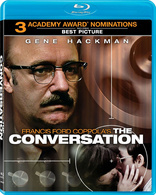
Movie rating
8.3 | / 10 |
Blu-ray rating
| Users | 4.2 | |
| Reviewer | 4.5 | |
| Overall | 4.5 |
Overview
The Conversation (1974)
A lone surveillance expert has a crisis of conscience when he suspects that the couple he is spying on will be murdered.
Starring: Gene Hackman, John Cazale, Allen Garfield, Frederic Forrest, Cindy WilliamsDirector: Francis Ford Coppola
| Drama | 100% |
| Psychological thriller | 30% |
| Mystery | 7% |
| Thriller | Insignificant |
Specifications
Video
Video codec: MPEG-4 AVC
Video resolution: 1080p
Aspect ratio: 1.78:1
Original aspect ratio: 1.85:1
Audio
English: DTS-HD Master Audio 5.1 (48kHz, 24-bit)
English: DTS-HD Master Audio Mono (48kHz, 24-bit)
Subtitles
English, Spanish
Discs
50GB Blu-ray Disc
Single disc (1 BD)
Playback
Region A (locked)
Review
Rating summary
| Movie | 4.5 | |
| Video | 4.5 | |
| Audio | 4.5 | |
| Extras | 4.5 | |
| Overall | 4.5 |
The Conversation Blu-ray Movie Review
Every single day, every thing you say, he'll be watching you.
Reviewed by Jeffrey Kauffman October 16, 2011In this post-9/11 world, we’ve become used to covert surveillance, and in fact to overt surveillance. Security cameras track our every move at local department and grocery stores, and in London, to cite just one example, there’s virtually no public place anywhere that isn’t under the watchful eye of a camera. The numbness many of us feel as we notice these omnipresent Big Brothers watching us is perhaps a defense mechanism, a wall we unconsciously erect from a perhaps atavistic fear that all of these cameras will indeed steal our souls. How incredibly prescient, then, was Francis Ford Coppola in 1974 when he tackled many of these same issues, albeit in microcosm, in his stunning film The Conversation? Coppola’s smaller, almost indie-like, production was somewhat eclipsed that year by the filmmaker’s immense triumph with The Godfather Part II, but in certain critical circles, The Conversation is perhaps the more lionized film. This disturbing look at a professional surveillance expert, Harry Caul (Gene Hackman in one of his career defining performances), is a frightening look at alienation, paranoia, and a perhaps necessary dissociation which is analogous to the numbness mentioned above. Caul is all about his business, in this case capturing and then deciphering a stolen conversation between two people (Cindy Williams and Frederic Forrest) as they make their way through San Francisco’s Union Square. Are these two married? Illicit lovers? What exactly are they talking about? These intriguing questions are compelling enough in and of themselves, but they open a window into Caul’s very soul, his raison d’être, which Caul no doubt wishes fervently would remain closed. Caul is overwhelmed by guilt of a past job gone horribly wrong, and as he finesses the recording of the couple, uncovering bit by bit more and more of what they’re saying, he becomes obsessed by the idea that tragedy awaits the pair and that he must do everything in his power to keep his findings from the client who hired him, something which is distinctly at odds with his "don't get involved" persona. Later in the film when Caul realizes he himself is (perhaps) being watched and listened to, the tables suddenly turn, and his guilt is suddenly thrust up against an increasingly manic paranoia about what secrets of his own might be divulged to some unknown “other”.
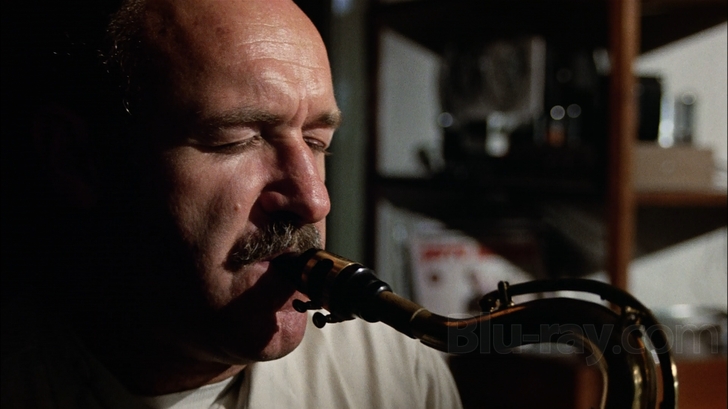
The Conversation starts with an overhead shot of San Francisco’s iconic Union Square, teeming with crowds during the holiday season. A bizarre electronic buzzing-beeping noise can be heard. What is that? The camera catches the antics of a mime performing for the crowd, and only after the film has revealed its main storyline do we understand this is perhaps Coppola’s famously impish sense of humor delivering a quiet but meaningful punchline, for a mime would be about the only person professional eavesdropper Harry Caul couldn’t listen to. Suddenly we see what looks like a young man aiming a rifle into the crowd from a perch atop a neighboring building and we wonder for a moment if we’re about to witness something akin to the University of Texas tower sniper killing spree in the sixties. Suddenly it’s clear this is no sniper, but someone armed with (then) high-tech eavesdropping equipment, which is honing in on a young couple in the square having an apparently banal conversation. We then figure out that Hackman’s character Harry Caul is in charge of a surprisingly large and sophisticated coterie of surreptitious listeners (and photograph takers), all positioned strategically around the park, including from a headquarters inside the back of a van fitted with one way windows that passers-by mistake for mirrors.
It’s one of this film’s brilliant left turns that instead of delving immediately into the mystery of the focal conversation and the couple having it, Coppola instead almost laconically drifts to following Harry, entering his rather sad and isolated private life. Harry is obviously a man who jealously guards his privacy, no doubt because he’s only too aware of how fragile personal space really is, and his apartment is a refuge where he can play along to his beloved jazz records on a dilapidated tenor saxophone. Slowly, though, Coppola, begins to let us Harry “in action,” as he attempts to filter through the crowd noise of his recordings of the couple to figure out what exactly they’re talking about and why it might be of such interest to his client.
The Conversation is rather subtle in how complex it is. Coppola makes no bones about having been inspired by Antonioni’s Blow Up, but for all the iconic Italian director’s famous discursiveness, Coppola, while a much more direct director (so to speak), actually delivers the much more complexly structured film. We return to the conversation again and again, always with a glint of new information, as Harry’s growing suspicions that the two people he’s been tailing may be in real life or death danger from his client. His natural inclination not to get involved is balanced against his immense guilt, fomented by his deep Catholic faith, that his inaction led to three deaths in a previous case.
This is an intriguing thriller that also owes as much in its own way to Hitchcock as it does to Antonioni (as Coppola himself avers with regard to one scene which he discusses in his excellent commentary included on this Blu-ray). But this is the Hitchcock of Vertigo, a slow but inexorable descent into madness and paranoia. It’s kind of interesting that both Vertigo and The Conversation are set in San Francisco and utilize the city copiously for location footage. But Hitchcock’s San Francisco is like the stuff of dreams, slightly ethereal and just out of reach. Coppola’s city by the bay is a gritty, grimy metropolis that’s dissolving before Harry’s eyes (keep an eye on the building across from his apartment house to see what I’m talking about).
Hackman has never been better than he is in The Conversation. Harry is a deeply conflicted character, and Hackman brilliantly balances Harry’s buttoned down persona with an incipient anxiety that is slowly taking over his better instincts. The scene where he viciously destroys a plastic Madonna fearing that there may be a listening device inside serves as a brilliant metaphor for Harry’s dissolution of faith in the face of his increasing paranoia. Several then young and relatively unknown actors give compelling supporting performances, including Cindy Williams and Frederic Forrest as the couple being eavesdropped upon, Teri Garr as a lady friend of Harry’s (doing a sort of Shirley MacLaine bit), and Harrison Ford as a perhaps overly natty assistant to Harry’s client, played by Robert Duvall. But it’s Coppola’s writing and sure-handed (and completely non-showy) directorial technique that make The Conversation such an immensely riveting accomplishment. Coppola talks quite a bit in his commentary about wanting to make more personal statements than the blockbusters with which his name is more usually associated. There’s probably no finer example of what he’s capable of in that regard than The Conversation.
The Conversation Blu-ray Movie, Video Quality 
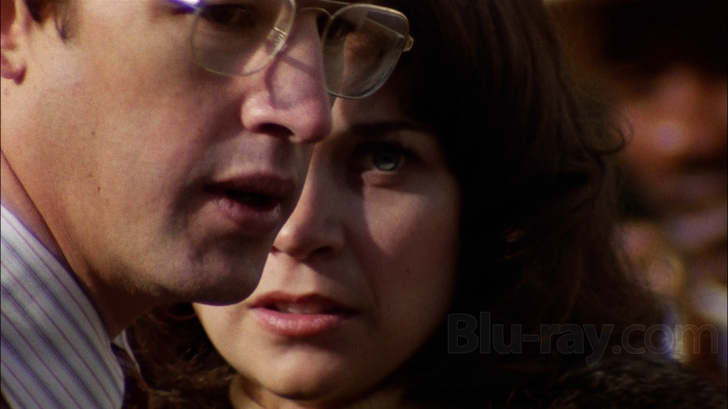
Keep a couple of things in mind as you watch The Conversation's AVC encoded 1080p transfer in 1.78:1. First of all, Coppola himself is on record in this commentary stating that with regard to the Union Square footage, he wanted to utilize as many of the kinds of cameras real surveillance experts would, replete with looks approximating smaller millimeter formats and technologies like zoom lenses, in order to give the film more of a verité feel. Coppola also talks about wanting even the more staged elements of the film to feel like a surveillance video, and so often cameras will suddenly veer off of the main characters and move into unexpected objects. This Blu-ray is frequently quite grainy, as befits its source elements, but it also is breathtakingly sharp almost all of the time, even within the context of Coppola's vision. Whole new levels of fine detail are apparent throughout the film, for the most part. There are a couple of strangely softer moments which I am assuming (with absolutely no proof whatsoever) might have been shot by a second unit. These include a shot of Harry sitting at a desk, one fade out shot of him playing his sax in his apartment, and a couple of establishing shots around San Francisco. Otherwise, though, this is a stellar effort that perfectly recreates the original film experience while upping clarity, saturation and contrast to considerable new heights.
The Conversation Blu-ray Movie, Audio Quality 
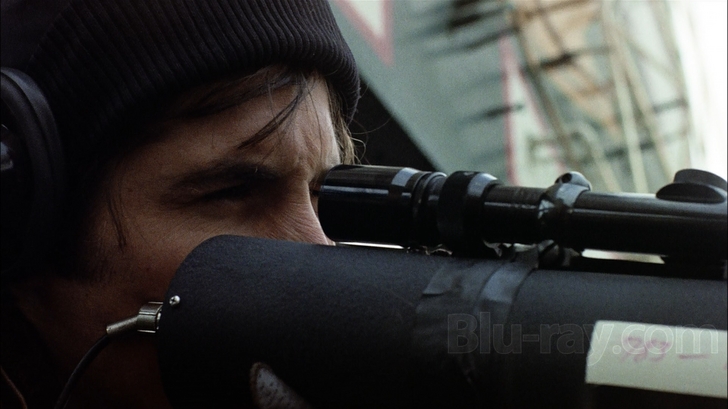
Perhaps because Coppola still co-owns distribution rights to The Conversation, it's been given a bit more care than usual with typical catalog releases, for we're offered not just the film's original mono track in lossless DTS-HD Master Audio 2.0, but also a very, very good, surprisingly nuanced lossless DTS-HD Master Audio 5.1 mix. Purists may want to stick with the mono track just to experience the film the way it was originally released, but I highly recommend at least checking out the 5.1 track, which has some incredible immersion, especially with regard to the central Union Square sequence, something the film returns to over and over again as it progresses. Voices dart in from the right and left, crowd noise moves seamlessly between channels and the wafting voices of Williams and Forrest peek through unexpected channels as they make their way around the square. David Shire's haunting score also sounds fantastic in the 5.1 repurposing. Dialogue is clean and clear, and fidelity is superb on both of these tracks. The Conversation is filled with intriguing, sometimes almost mystifying, sound effects, and those also pop with a sonic vivacity that really makes this one of the standout catalog releases of the year in terms of a repurposed 5.1 mix.
The Conversation Blu-ray Movie, Special Features and Extras 
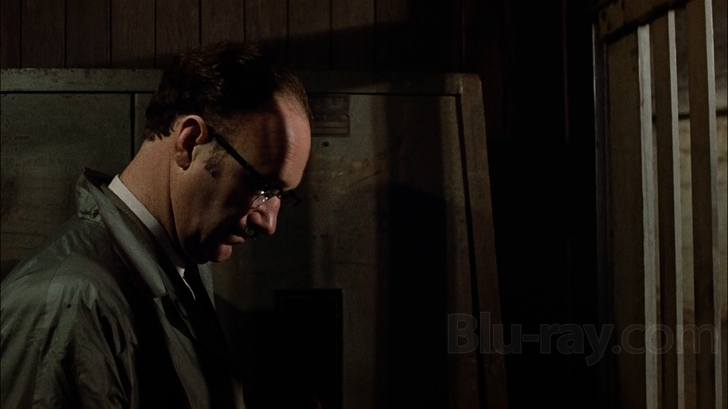
- Feature Commentary With Writer-Director Francis Ford Coppola. This is a brilliant commentary, one which gets right into the nuts and bolts of the movie business, talking about how Coppola tends to put aside screenplays, thinking they're no good, and that when he has them finished, he can't find funding for them. He talks about the unexpected success of The Godfather, and how that opened manifold doors for him, allowing The Conversation to move ahead. Coppola also talks about his being inspired by Antonioni's Blow Up, and his wish to utilize repetition in the telling of his story, something which comes into play as we hear (and see) the titular conversation happening over and over throughout the film, always in new contexts and with glimmers of new meaning and understanding. Coppola deals with just about every subject imaginable here, from casting to shooting to editing, as well as some of the problems he encountered, including letting original DP Haskell Wexler go because Wexler saw the film as a sort of Thomas Crown Affair while Coppola states he saw it as more of a Medium Cool. All in all, one of the best commentaries ever—informative, entertaining and insightful.
- Feature Commentary With Editor Walter Murch. While not quite up to Coppola's commentary, this, too, is a fascinating listen, if only because The Conversation is so dependent on its editing and its sound design (which Murch also facilitated as the film's sound mixer). Murch's commentary has quite a few more quiet spots than does Coppola's, but when he does speak, he offers a really interesting array of input about the film's editing and sound, two integral elements to the film's success.
- Close-Up on The Conversation (HD; 8:39) is a great little vintage featurette showing Coppola and Hackman at work.
- Cindy Williams Screen Test (HD; 5:02) has the actress reading for the part ultimately played by Teri Garr.
- Harrison Ford Screen Test (HD; 6:45) actually has Ford auditioning (with Williams) for the part that Frederic Forrest ended up playing in the film.
- "No Cigar" (1080i; 2:26) is a brief 1956 student film by Coppola, which is seen here with a Coppola introduction and narration. Coppola feels the main character in this short (played by his Uncle) sowed the seeds for Harry Caul decades later.
- Harry Caul's San Francisco—Then And Now (HD; 3:43) is a cool look at several locations utilized in the film as they were in 1973 and as they appear now.
- David Shire Interviewed by Francis Ford Coppola (HD; 10:57) is kind of funny (Coppola shouts out to Shire to introduce himself as Shire is playing the film's theme on an upright piano). Shire talks about scoring the film and how important music was to setting the film's melancholy mood.
- Archival Gene Hackman Interview (HD; 4:04) is a 1973 sit down with the actor talking about the character of Harry Caul and the picture generally.
- Script Dictations from Francis Ford Coppola (HD; 49:23) is an absolutely fascinating audio-centric supplement with Coppola literally dictating the screenplay, playing along to typed versions of the pages and clips from the film.
- Theatrical Trailer (HD; 2:50)
The Conversation Blu-ray Movie, Overall Score and Recommendation 
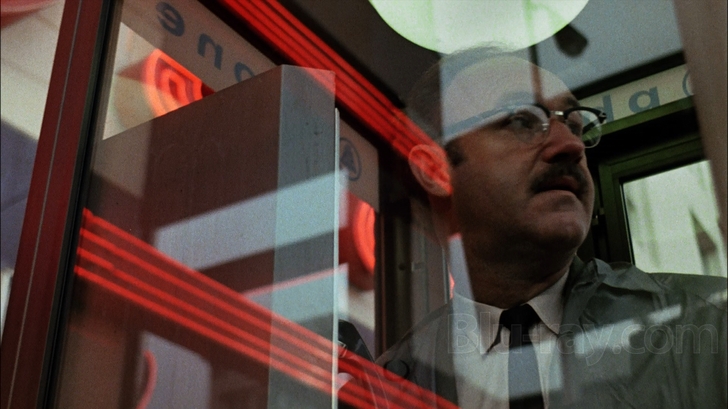
The Conversation is arguably Francis Ford Coppola's finest film. It is certainly one of his most personal, as he himself talks about at length in his commentary. Haunting, moody, melancholy and in the end significantly disturbing, this is a film that manages to put the emphasis on the "you" of "Big Brother is watching you." In this instance, Big Brother Harry Caul is a deeply conflicted man who ultimately can't separate his professional detachment from his innate desire to prevent a tragedy. Brilliantly structured, impeccably performed, and smartly written and directed, The Conversation is quite simply one of the most brilliant films of the seventies, and quite possibly well beyond. This Blu-ray looks and sound magnificent, and comes jam packed with fantastic supplements. Highly recommended.
Similar titles
Similar titles you might also like

Tinker Tailor Soldier Spy
2011

Marnie 4K
1964

Taxi Driver
1976

Straw Dogs
4K Restoration
1971

The Manchurian Candidate 4K
1962

Eyes Wide Shut
1999

Martha Marcy May Marlene
2011

Rebecca
1940

Seconds
1966

The Game
1997

Shadow Dancer
2012

Wake in Fright
1971

Tetro
2009

We Need to Talk About Kevin
2011

Chinatown
1974

3 Days of the Condor
4K Restoration
1975

Black Swan
2010

You Were Never Really Here
2017

Buster's Mal Heart
2016

The Killing Room
Experiment Killing Room
2009